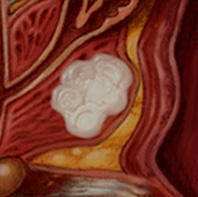
Now, Steffen Theobald, a nutritional consultant and manager at the Scientific Association for the Improvement of Patient Competence in Germany updates the role of nutrition in the development, prevention, and treatment of prostate cancer.
- Obesity may increase both primary risk and biochemical (increase in prostate specific antigen [PSA]) or clinical recurrence of prostate cancer
- High intake of total fat, saturated fats, meat, dairy, and calcium are related to increased risk
- Higher intake of tomato products, soy, lycopene, selenium, omega-3-fatty acids from fatty fish, and vitamin E in smokers may lower the risk of prostate cancer
- Tomato products and selenium in the diet delay progression of prostate cancer
- Taking selenium during chemotherapy and/or radiotherapy may decrease treatment-related toxicities and increase the effect of therapy on cancer cells
Overall, the concepts about nutrition and prostate cancer have held true and expanded over the past decade.
Illustration: Isreal21c
10/26/06 09:24 JR